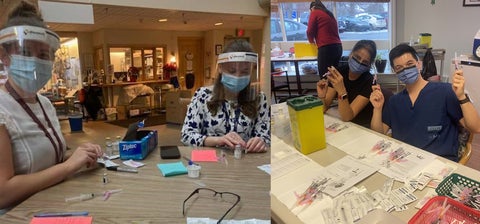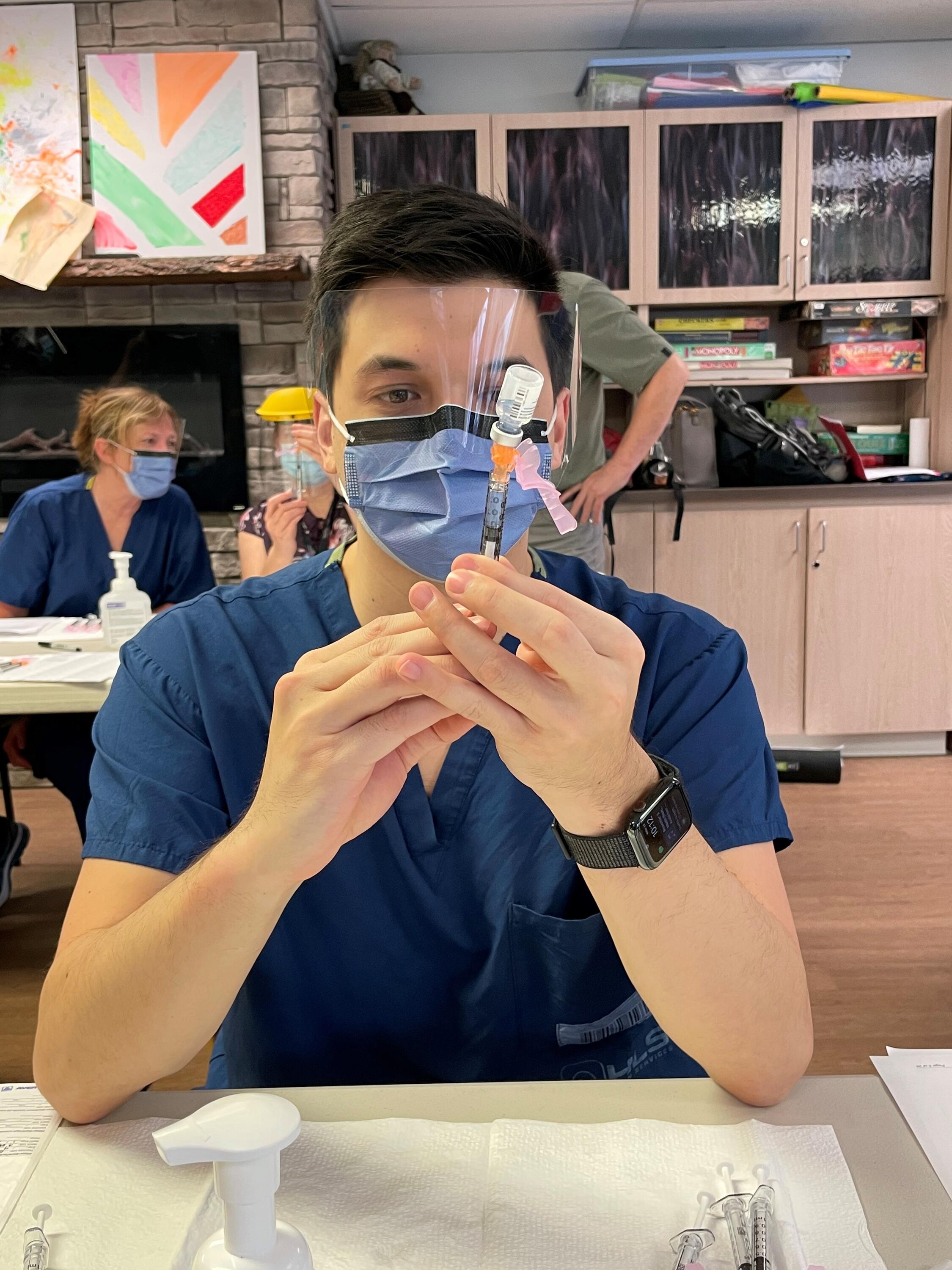
Pharmacy alumnus and students from Ottawa hospital help vaccination effort in long-term care homes
Long-term care homes are among the hardest hit institutions in terms of COVID-19 infections in Canada. When vaccines began to arrive in Canada, long-term care (LTC) homes were consequently identified as a high priority for vaccination.
In Ottawa, the public health unit asked local hospitals to help with vaccine distribution to high-risk areas like LTC homes and retirement communities.
“I’ve worked at the Children’s Hospital of Eastern Ontario (CHEO) since I finished my rotations here,” says Alex Wong, recent Waterloo Pharmacy graduate. “I knew that anything I could do to help the vaccination effort would bring us closer to ending this pandemic, so I didn’t hesitate to participate.”

Alex preparing a vaccination
Wong, along with other pharmacists, technicians and pharmacy students from CHEO, joined public health nurses on mobile vaccination clinics in the homes. Before the vaccine was widely available, all members on the mobile clinic completed weekly PCR tests for COVID before entering the institutions. Later in the process, members of the mobile team also received their vaccines.
The pharmacy team members were responsible for picking up the vaccine from cold storage and delivering it to the homes. Once there, they led the preparation of the doses.
“Pfizer is a tricky vaccine to work with. It has to be diluted with saline before administration, and we worked under a medical directive that allowed us to prepare vaccines for the physicians and nurses administering them,” Wong says.
Depending on the supplies available to the pharmacy team, it can be challenging to consistently draw the sixth dose from the vial of vaccine. Pharmacy professionals have experience managing a variety of medication types, and their expertise was well-suited to this task.
“I knew that the vaccine effort would benefit from the pharmacy team’s skill in dose preparation,” says Wong. “I even had the opportunity to teach other nurses to reconstitute the vaccine, share my knowledge, and represent our pharmacy department.”
Running the clinics in LTC and retirement homes was not without challenges.
“We were always very conscious of needing to minimize any vaccine waste,” says Wong. “We were also assigned to homes on an as-needed basis and would often only find out about our assignment the day prior. The weeks were challenging to schedule.”
Over the course of three months, the CHEO teams made dozens of visits. Their team was also supported by current co-op students like Alicia Davis and Valerie Tremblay.

Rx2023 co-op students Valerie Tremblay (left) and Alicia Davis (right) preparing vaccines for injection
“Our team typically ran two clinics a day,” Tremblay says. “The number of doses prepared depended on the needs of the specific sites.”
The team collaborated with the public health nurses and physicians to ensure as smooth an experience as possible for residents. They also provided training on reconstituting the vaccine to nurses at the LTC homes to ensure they could prepare doses for newly admitted patients and patients unable to receive vaccinations when the mobile clinic visited.
“We felt immense gratitude from the LTC staff, and I felt very appreciated supporting the team in this way,” says Davis. “I have returned to a few LTC homes that I had worked at previously while they were under outbreak safety measures and it was marvelous to see residents back in communal spaces and in better spirits now that they had received their vaccinations.”
For many, both residents and staff, the vaccination process was a positive experience that gave people a sense of hope.
“It was incredibly rewarding to see the residents get so excited about receiving their vaccine,” says Tremblay. “We made an excellent team with Ottawa Public Health and their nurses that led the clinics. It was such a wonderful experience to be able to help out in these efforts.”
Now that the high-priority vaccination campaign in long-term care homes is complete, Tremblay, Davis and Wong support the broader vaccination effort in their community.